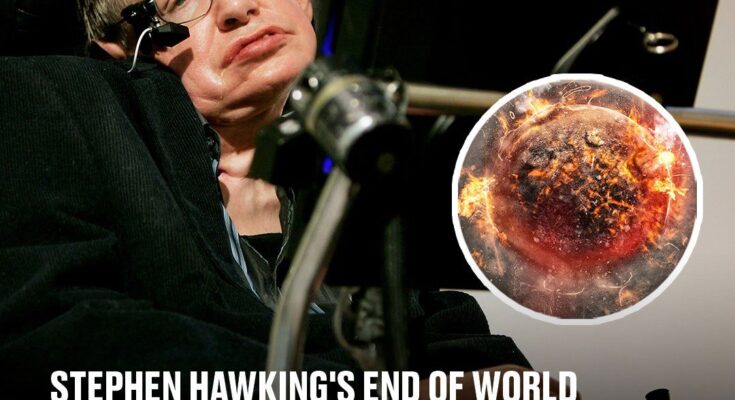
Stephen Hawking Predicted The End, and It’s Going To Be Here Sooner Than We Think
Stephen Hawking, one of the most renowned physicists of our time, made chilling predictions about humanity’s future. Before his death in 2018, Hawking warned that the Earth could transform into a “giant ball of fire” by the year 2600 due to exponential population growth and energy consumption. His predictions serve as a wake-up call for humanity to address these critical issues before it’s too late.
Climate Change

Hawking repeatedly emphasized the threat of climate change, which he believed could bring Earth to the brink of disaster. He feared a “tipping point” where global warming would become irreversible, likening Earth’s future to that of Venus with searing temperatures and acid rain. His warning about climate inaction remains more relevant than ever.
Nuclear War and Pandemics

In addition to environmental concerns, Hawking identified nuclear war and pandemics as significant threats to humanity. “Although the chance of a disaster to planet Earth in a given year may be quite low, it adds up over time,” he told the BBC in 2016. Recent global events have underscored the real dangers these threats pose.
Read More: Stephen Hawking Left a Heartwarming Message for Anyone Dealing With Depression
Artificial Intelligence

Hawking saw great potential in artificial intelligence (AI) but also warned of its dangers. He famously stated that “the development of full artificial intelligence could spell the end of the human race”. While AI has the power to revolutionize industries, its unchecked advancement could lead to unintended and catastrophic consequences.
Colonizing Other Planets

Hawking believed that humanity’s long-term survival hinged on colonizing other planets. He urged that we start settling other worlds to avoid putting “all our eggs in one basket“. He supported projects like Breakthrough Starshot, which aims to explore interstellar travel and find new habitable planets.
The Multiverse and Our Cosmic Place

In his final work, Hawking explored the multiverse theory, suggesting the existence of multiple universes beyond our own. He posited that understanding these other universes could help us better comprehend the eventual fate of our own. His research highlights humanity’s small yet significant place in the cosmos.
A Pivotal Deadline

Hawking predicted that if current trends continue, by 2600, the Earth would be so overcrowded and energy-intensive that it would glow red-hot. He warned that humanity needs to act decisively to prevent this grim scenario. This deadline, though far off, underscores the urgency of tackling global issues now.
Read More: Stephen Hawking said he had a simple answer when asked whether he believed in god
The Search for Intelligent Life

Hawking also cautioned against broadcasting our existence to potential extraterrestrial civilizations. He likened it to Columbus landing in the Americas, which didn’t end well for the native populations. Despite this, he supported projects like SETI that aim to listen for signs of intelligent life elsewhere in the universe.
A Legacy of Warnings and Hope

Stephen Hawking’s predictions were not meant to inspire fear but to provoke action. His insights into humanity’s existential threats—ranging from climate change to AI—highlight the urgent need for global cooperation and innovation. While his timeline for disaster may seem distant, the time to act is now.



